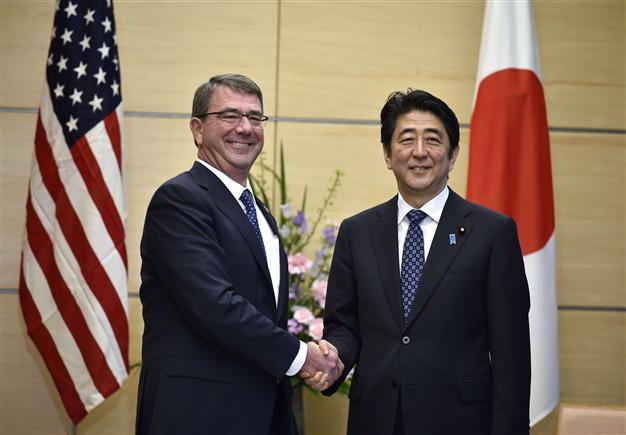US, Japan trust each other but both wary of China
TOKYO – Agence France-Presse

US Secretary of Defense Ashton Carter (L) shakes hands with Japan's Prime Minister Shinzo Abe at the start of their meeting at Abe's official residence in Tokyo on April 8, 2015. AFP Photo
Over seven decades after Japan attacked Pearl Harbor and dragged the United States into a global war, Americans and Japanese overwhelmingly trust each other and are wary of China, an opinion poll has shown.
In contrast to the oft-heard calls from Beijing for more Japanese contrition over World War II, around two-thirds of Americans believe Tokyo has apologized enough or has no need to say sorry.
The findings, released April 7 by the U.S.-based Pew Research Center come just weeks before Shinzo Abe is set to travel to the United States, where he will become the first Japanese prime minister to address a joint session of the U.S. Congress.
His speech will be carefully watched for any indication of how he will mark the 70th anniversary of the end of WWII later in the year, with Beijing urging him to “show sincerity” over his nation’s past crimes.
But the poll by Pew found no significant animosity exists between people in Japan and the U.S., despite their four years of war until 1945 and the subsequent American occupation until 1952.
“Adversaries in World War II, fierce economic competitors in the 1980s and early 1990s, Americans and Japanese nonetheless share a deep mutual respect,” the think tank said in its annual report based on the survey of 1,000 people from each country.
About 68 percent of Americans trust Japan and 75 percent of Japanese trust the United States, the survey showed, while only 30 percent of Americans and seven percent of Japanese trust China.
Six in 10 Americans believe that the rise of China as a military and economic power makes relations between Japan and the United States more important, it said.
At the same time, “more Americans, especially young Americans, think it is important to have strong economic ties with China than believe it is important to have such ties with Japan,” it said.
“A majority of Americans see Japan as a status-quo economic power, neither rising nor declining.”
Japanese brands fare well in U.S. public opinion, with Sony seen in a favorable light by 88 percent of respondents and carmaker Toyota by 85 percent.
However, for Brand Abe, the news was not so good: “only 11 percent of Americans have a favorable view of current Japanese Prime Minister Shinzo Abe.”
“But this can largely be attributed to the fact that 73 percent say they have never heard of him,” it said.
On questions of history, the atomic bombings of Hiroshima and Nagasaki, which killed 140,000 people and 70,000, respectively, has long divided Americans and Japanese.
In the latest survey, 56 percent of Americans say they believe the use of nuclear weapons was a justified means of ending the war; 34 percent said it was not.
In Japan, only 14 percent say the bombing was justified, versus 79 percent who say it was not.
“Despite this lingering disagreement over the justification for Hiroshima and Nagasaki, few Americans or Japanese believe Japan owes an apology for its actions during WWII,” it said.
A total of 61 percent of Americans say either Japan has apologized sufficiently for the war or no apology is now necessary, against 29 percent who say Japan has not apologized enough for its actions during the conflict.
